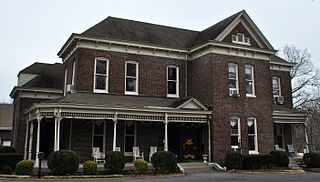
Sevierville is a city in and the county seat of Sevier County, Tennessee, located in Eastern Tennessee. The population was 14,807 at the 2010 United States Census and 17,117 according to the 2019 census estimate.

Marr & Holman was an architectural firm in Nashville, Tennessee known for their traditional design. Notable buildings include the Nashville Post Office, now known as the Frist Center for the Visual Arts and the Milliken Memorial Community House in Elkton, Kentucky.
Samuel Cole Williams was a noted 19th and 20th century Tennessee jurist, historian, educator, and businessman.

Tipton-Haynes State Historic Site, known also as Tipton-Haynes House, is a Tennessee State Historic Site located at 2620 South Roan Street in Johnson City, Tennessee. It includes a house originally built in 1784 by Colonel John Tipton, and 10 other buildings, including a smokehouse, pigsty, loom house, still house, springhouse, log barn and corncrib. There is also the home of George Haynes, a Haynes family slave.

The John Hunter House, also known as McCullough House, near Franklin, Tennessee is an Italianate style house that was built in 1875. It was listed on the National Register of Historic Places (NRHP) in 1988.

College Grove is an unincorporated community near Franklin and Murfreesboro in Williamson County, Tennessee. College Grove is predominantly rural.

The Knights of Pythias Pavilion in Franklin, Tennessee, also known as Carlisle House, is a Classical Revival architecture building designed by Henry Gibel and built in 1897. It was listed on the National Register of Historic Places in 1988.

The William S. Campbell House is a property in Franklin, Tennessee that is listed on the National Register of Historic Places. It was added to the list in 1975. A private residence, it is also known as Magnolia Hall and was built in 1840. It is part of the Boyd Mill Avenue Historic District. William S. Campbell was born in Ireland, and opened a national bank in the area after the American Civil War.

The Maney-Sidway House, also known as Jasmine Grove and as Myles Manor, is a building in Franklin, Tennessee originally built c.1836, that was listed on the National Register of Historic Places in 1988.

The Henry H. Mayberry House, also known as "Riverview", is a private home in Franklin, Tennessee located on Franklin Pike just north of the Harpeth River Bridge. Built in 1902 in Neo-Classical or Classical Revival architecture, it is one of the notable residences of the 1900-1935 period in Williamson County. At the time it was built it had the most technologically advanced utilities in the county, including electric lights and its own water works. It was listed on the National Register of Historic Places in 1988. When listed, the property included an area of 26 acres (11 ha).

The McGavock–Gaines House, also known as Riverside, is a historic mansion in Franklin, Tennessee. It was listed on the National Register of Historic Places in 1988. The property then included two contributing buildings, one contributing structure, and one non-contributing building, on an area of 3.2 acres (1.3 ha).

Glen Echo, also known as Harpeth Hall, is a property in Franklin, Tennessee that was listed on the National Register of Historic Places in 1976. It is a former plantation house that is now the centerpiece and administrative office of the Battle Ground Academy campus.

Cox House is a building in Franklin, Tennessee that was listed on the National Register of Historic Places in 1980. It is also known as the Harpeth Academy building.

The Franklin Hardeman House is a property in Franklin, Tennessee that was listed on the National Register of Historic Places in 1988. The property is also known as Sugar Hill and is denoted as Williamson County historic resource WM-291.

The John Crafton House is a historic property in Franklin, Tennessee, United States, that was listed on the National Register of Historic Places on April 13, 1988.

The Mordecai Puryear House is a center-hall house in Franklin, Tennessee, United States, built around 1830. Mordecai Puryear was one of the ten original investors in the National Bank of Franklin in 1871. The bank "was one of the primary financial institutions of the county" until it failed in 1926.

Thomas Shute House is a property in Franklin, Tennessee, United States, that was listed on the National Register of Historic Places in 1988. The property has also been known as Creekside. It dates from at c.1845. When listed the property included three contributing buildings, and two contributing structures on an area of 4.8 acres (1.9 ha). The property was covered in a 1988 study of Williamson County historical resources. It is one of about thirty "significant brick and frame residences" surviving in Williamson County that were built during 1830 to 1860 and "were the center of large plantations " and display "some of the finest construction of the ante-bellum era." It faces on the Franklin and Columbia Pike that ran south from Brentwood to Franklin to Columbia.

The H. G. W. Mayberry House, also known as Beechwood Hall, is a historic antebellum plantation house built in 1856 in Franklin, Tennessee.

Mooreland is a property in Brentwood, Tennessee that was built c.1838 and that was listed on the National Register of Historic Places in 1975.

Mountview is a property in Brentwood, Tennessee that was built in 1860 and that was listed on the National Register of Historic Places in 1986. It has also been known as the Davis-Rozelle Residence.















